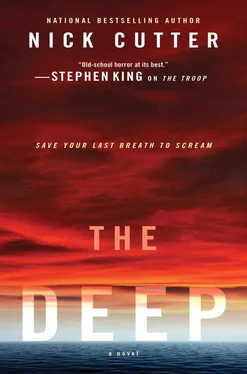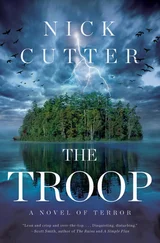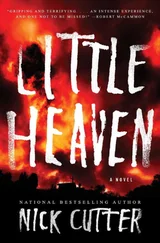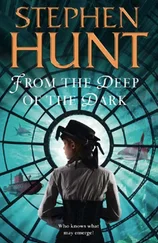That’s how my mind feels down here. A layer of blackness exists between my brain—the functioning gray matter—and my skull. It makes thinking difficult.
The three of us have kept to ourselves the past day or so. It’s hard telling the days apart with no sunlight to mark the passage of time.
The first few days we’d shared meals together. Conversation was sparse but cordial. But the fondness established between us on the Hesperus dried up. We’d been having difficulty locating the ambrosia. The sensors picked up nothing at all. Clayton had been working with the smallest shred, culled from Dr. Parks’ specimen and parceled out between him and Dr. Felz; it was nearly gone, either vaporized or collapsing from some organic malaise. The sea floor was empty. Had the station been built in the wrong spot? Was there any more ambrosia to be found?
Hugo in particular is far from a happy camper. He complains bitterly about the temperature (admittedly frosty), the food, and other petty inconveniences that should be expected when one is living at the bottom of the Pacific.
Hugo is agitated, too. His eyes scan the tunnels as if he’s tracking something—a runaway lizard or guinea pig perhaps. I’ve seen him blink flinchingly, as though tiny balls of heat lightning were popping in front of his face. Yesterday I encountered him in the animal lockup, a glazed expression on his face, drool bubbling from his lips.
The sea-sillies, I believe Al called them.
As yet, the bees register no adverse effects. The dogs seem jumpy and sensitive, however. Clayton claims it’s natural, but I’m not sure Clayton understands emotions at all, canine or otherwise.
As for my own mental well-being… I feel as one ought to when eight miles underwater, in a conglomeration of spidery metal hoses that could collapse on my next breath, combing the ocean floor for scraps of effluvia…
I had another nightmare last night. I suppose I should speak of it.
A man named Huey Charles killed five children in my hometown when I was a boy. He was, of all things, an ice-cream man. He drove a white truck with a rainbow on the side. The van played a jingle as it drove down our sedate streets—a tinkling song, sort of queer, like when you open the lid on a music box to see a little ballerina pirouetting inside.
Tinka-tink-teeeee-ta-tinka-tink-teeeeee…
Huey—he asked you to call him Uncle Huey—was a rotund, bespectacled man. The last man you’d peg for a child killer, despite the fact he was an overalls-wearing Pied Piper who drove the equivalent of a glue trap for kids. I remember his glasses. Greasy and dirty, the edges gritted with the crust that accumulates at the edges of your eyes while you’re sleeping. I never ordered soft-serve from him—I was revolted by the thought that some of that eye crust might sift down from Huey’s glasses onto my vanilla swirl.
He killed three boys and two girls. Although he didn’t just kill them—do creatures like Uncle Huey ever just kill? What he did was beyond anything you could imagine. He was patient. Years passed between the disappearances. He had a sixth sense, I guess, about when to strike. Those like Huey usually do. He’d wait until the daylight was guttering, until that last kid scampered up to his truck… He’d ask if they wanted one of his special sundaes. Just step into the back, then, where it’s dark…
If that child’s parents should happen along, okay, well, Huey was only making the kid a special treat. That Huey, whatta guy! He was well liked around town, though nobody would have called him a friend or could recall spending time alone with him. He was a member of the Elks, the K of C, the Rotary Club; he’d stuff his bloated butt into a tiny car, slap a red fez on his head, and putt-putt down Main Street during the Ledyard Shriners’ Parade. Yes, good ol’ Uncle Huey.
Now if that child’s parents didn’t happen along, well, then I imagine a certain look must’ve come into Uncle Huey’s eyes. And the time that child realized the danger in that look was the same moment it ceased to matter.
He took them to the woods. Lots of woods in that part of the country. Deep, dark, silent. A kid’s scream could easily be mistaken for the shivering cry of a loon, or the screech of a mountain lion.
What he did to them never made the papers—only the insinuations. One article said the police found a large tool chest in Huey’s house with the word Toybox on the lid. Plus there was the fact that the funerals were all closed-casket affairs.
One of the girls lived a few blocks away from me. Tiffany Childers. In my memory she exists as a cliche. Blond hair spilling over her shoulders in ringlets, a starspray of freckles across her cheeks.
They never found Tiffany’s head. That little tidbit did leak out to the public. Loose lips at the coroner’s office.
Anyway. The dream. I’m in the woods. An orange band of light limns the horizon, casting its light between the firs.
Huey’s truck rests on the periphery of my sight. I can see the rainbow on the side. I walk toward it, not wanting to but helpless. The truck’s making that tinkling jingle. Taa-ta-teeeee-tinka-tinka-taaa-teeeee. It’s awful—not even a song. It’s just a discordant collection of notes, an ugly sonic slap.
The truck’s back doors are thrown open. The sun, gashing through the trees, highlights the slashes of blood on the white paint.
Things are hanging inside. Dangling down beside the soft-serve machine and next to the sleeve of sugar cones. Parts of bodies. They hang on snarled lengths of copper wire. They brush against one another in a breeze that skates across the forest floor. They make a faintly musical note, like wind chimes. They shouldn’t, but they do.
I look down and see that I’m wearing a white uniform—Uncle Huey’s ice-cream man uniform. I am fat, my belly swelling to the point I can’t see my belt buckle. Suddenly I realize I cannot see very well, either; it’s as though I’m staring through a crusty, grease-smeared window.
I become aware of the sound of my own insectile thoughts. Imagine lowering a boom microphone into a tub of night crawlers—that squishy, squirming sound. That is the noise inside my skull.
And the worst part is, I’m at home with that sound.
I awoke back in the Trieste, in the tunnels. I’d gotten up and walked out of my quarters. I’ve never sleepwalked before, ever.
I was caressing a pipe running down the tunnel… caressing it as I might the leg of my own daughter to soothe her to sleep.
I had an erection.
A raging hard-on, one better suited to a hormonal teen. Even my second wife—the most inventive hellcat I’ve ever shared a bed with—couldn’t bring me to such nail-pounding hardness.
Morning wood. That’s all it was. Morning wood.
Monday, June 31 (?)
Success! We’ve discovered trace elements of ambrosia. The sensors picked it up two days (???—time has surrendered most of its meaning down here) ago.
With good news, though, comes bad. Hugo has isolated himself. Surely you know this already, having watched it on the monitors. He has locked himself in the animal quarantine quarters, abandoning his lab.
He’s got the sea-sillies, all right. A crippling case. Clayton and myself debated capturing him, to make sure he didn’t punch a hole in the wall with the first sharp object he could lay his hands on. But he doesn’t strike us as dangerous. Only terrified and mistrustful.
Not long before he locked himself up, I encountered Hugo in the main lab. He’d switched on the spotlights and was staring over the ocean floor. It is, admittedly, a soul-sapping vista. Your heart trembles just to see it.
“If you look long enough,” Hugo said, “you can see it move.”
Читать дальше












